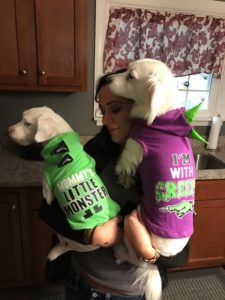Nine Tips for Keeping Senior Dogs Happy, Healthy, and Active

The golden years. A time where you can settle down to enjoy the simple pleasures of life. There is no pressure to run around aimlessly or chase the next squirrel that takes a jaunt through your yard. Yes, we are talking about the golden years for our dogs. Just because your pup is getting a little gray around the muzzle doesn’t mean that they must retire from their career of chasing tails and playing fetch.
Senior dogs can behave much differently from when they were puppies. They are the same buddy you had adopted long ago, but they may have different abilities and different habits. They may sleep a little more. They may become less interested in the taking long walks. And they may even have different eating habits. All these things may suggest boredom or depression. But, have no fear! There are ways their human companions can combat the doggy blues.
These 9 tips can help your furry friend revel in their golden years.
Hard floors are not fun to sleep on at any age but having a nice comfy bed to cuddle up in at night sure does help with the aches and pains of getting older. Orthopedic beds and memory foam may be a great solution to help with discomfort. Blankets are also nice especially if your home gets drafty.
2. Brain games
Keep your dog’s brain sharp. Did your dog used to love playing hide and go seek or finding toys hidden around the house? You can still do all of these fun activities, but maybe your dog needs a little push to engage in mentally stimulating games. Toys where you can hide treats or make sounds are especially helpful to peak their interests. Puzzle games are a great way to keep your dog mentally sharp in their golden years.
3. Modify regular activities
Long walks in the park, hours of playing fetch, and baths are all regular activities that may need to change as our pups age into mature dogs. Walking miles on the trail with your dog may need to be replaced with shorter, less strenuous walks around the neighborhood as your dog ages. Games like fetch, Frisbee, and tug-of-war may need to be modified to be less intense and energy consuming. Bathing can also be hard if your senior dog has mobility problems. You may want to opt for doggy dry shampoo products, doggy wipes, and less frequent bathing if at all possible.
4. Checkups are crucial
Taking your dog to the vet is huge at any age. Vets are specially trained to deal with dogs at all stages of their lives. They know just what to do and can help calm some of the anxiety you as the owner have as your dog ages. Ask questions. Be aware of mood, diet, and mobility changes. Regular checkups can help prevent disease and help treat symptoms of aging. Vets can also prescribe medicine for your dog’s joints, aches and pains, and more serious ailments that your dog may encounter.
5. Introduce a younger pup
Puppies can bring a smile to anyone’s face. They love to run around, chase tails, and have energy to spare. Having a new friend for your senior dog may be a good thing. Doggy depression and loneliness can happen at any age, but senior dogs are especially susceptible. Your ageing companion may get even lonelier when you are not at home. They may be less likely to venture out and make play time for themselves. But puppies, can make play out of anything. Introducing another pet can be rough, but if done correctly, this could help make your older pup happier. Having a buddy to play, snuggle, and keep an eye on 24/7 may be what your senior dog needs to keep motivated when mom or dad isn’t home.
 6. Make their favorite spots more accessible
6. Make their favorite spots more accessible
Creaky joints, achy muscles, and mobility limitations are not just a thing that human seniors need to worry about. Our dogs may have the same problems as they age. Ramps may help get up onto the couch or bed. Limiting your dog’s access to stairs when you are not home may be a good idea too. Injuries may occur as your canine companion tries to climb stairs. Placing a gate or barrier in front of the stairs could prevent injuries when you can’t be at home to supervise your dog.
7. You are what you eat
As pets age and change, so should their diets. Consider speaking with your vet to see what kinds of adjustment need to be made to your dog’s diet. They may be packing on the pounds, losing weight, or don’t like their favorite brands of food anymore. At all ages, dogs need a nutrient rich and diverse diet to keep them happy and healthy. In their golden years however, there may need more tinkering to get that balance perfect.
Your dog is your best friend. You know your furry-friend the best. If your dog starts to act out of character, you should always keep note of the behavior. Does Fluffy sleep a little more than usual? Does Fido get irritated when you try to pet them when he usually loved belly rubs? Are they eating differently or eating more or less than usual? Write all changes in behavior down so that when your next vet’s appointment comes around, you can ask the vet if you should be concerned. Just like humans, dogs are more susceptible to sickness, depression, and injury as they age. Changes in behavior can be a huge indication that your pet may be experiencing the full effects of aging.
9. Love them up
The golden years for dogs are a time full of change and modification. It can be scary to age, but that doesn’t mean that your pet has changed completely. They still require all the love and attention they did when they were puppies or middle aged. If anything, take more time to give belly rubs, kisses, and cuddles! I am sure your senior pup would appreciate it!
What tips do you think are helpful when taking care of a senior dog? Leave a comment and let us know!



